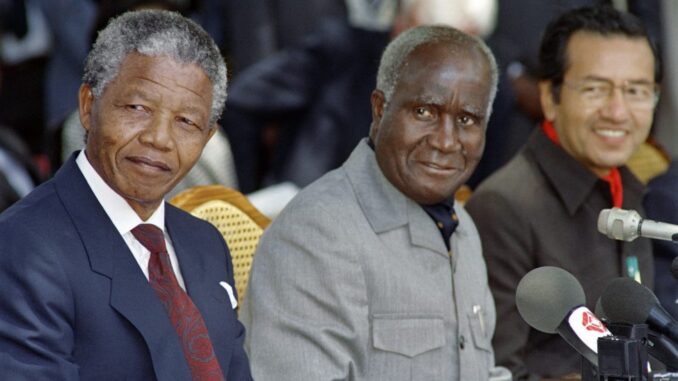
Founding father and President of Zambia, Kenneth David Kaunda (1924-2021) would be remembered as one of those rare revolutionaries that won independence without bloodshed.
Kaunda led with exceptional love for humanity and emotions for his people. Though he was politically imperfect, his foibles forgivable, he remains an icon of nationalism and of courageous leadership that today’s African countries need urgently.
Born in April 1924, in Lubwa, then Northern Rhodesia, young Kaunda had a good parentage and tutelage in a family of eight children. At the foot of his father, a reverend in the church, he learnt two commandments that stuck with him lifelong: love God and love your neighbour. The second is the golden rule: “Do unto others as you wish them to do unto you.” Indeed, he loved the people with great emotions that welled up tears on their behalf. And despite provocations of colonialism and injustices of white minority rule, Kaunda neither betrayed formative values nor descended into violence. Reading works of Mahatma Gandhi in and out of British-run jails further strengthened his iron resolve on non-violence liberation revolts, coupled with self-renewal by which gave up drinking and smoking. His liberation push in the 1960s was famously known as the “cha-cha-cha” campaign, rallying for a nation that is home to everyone, including Europeans.
Upon winning independence in 1964 and renaming Northern Rhodesia to Zambia, Kaunda kept his promise of a cosmopolitan country that works for all. He lived simply and in solidarity with the poor. While he resided in a house without dedicated power and running water, he was building roads, houses, schools and clinics in Zambian suburbs for the comfort of the people. And before long, the new Zambia became a land of wealth from the export of copper and respect for all races, colours and religions.
Kaunda was a man of good reasoning and ideas too. And he was never shy of executing even the unpopular ones. KK, as he was also called, invented “Zambian Humanism,” a moral philosophy from an admixture of Christian teachings, socialism and African traditions – for all to live by and in unity. The central theme was the primacy of man and human equality; no fellow should be richer than another, no man should exploit another, each person has value and dignity.
Fallout of his utopia was a weird idea about political opposition in a democracy. He reckoned that tolerance of opposition in a multi-cultural and multi-party democracy could only embolden enemies to undermine his rule and tear the country apart. So, for 26 of his 27 years in power, the strongman-president was hostile to opponents, silenced and imprisoned dissents like Simon Kapwepwe and kept shifting the goal post of the ruling party to prolong his stay in office. With a firm grip on the wheels, Kaunda routinely won presidential elections unopposed with 80 per cent majority.
But the centrepiece of the Zambian economic boom was its doom too. Apparently, in accordance with the philosophy of equality and an attempt to eliminate class conflicts between foreign miners and local farmers, Kaunda nationalised the copper mines in Zambia, froze miners’ wages and prices. The move proved suicidal; discouraging farmers, miners and investors alike. By 1974, a global decline in copper receipts rendered Zambia broke. Instability in neighbouring countries and spike in petroleum prices all made import and export of goods impossible for landlocked Zambia. Its woes were compounded, becoming one of the most indebted countries in the world.
After years of hesitation, Kaunda’s Zambia submitted to the dictates of the International Monetary Fund (IMF) in 1989, introduced austerity measures that cut off food supplies to the people. Attendant riots and multi-party elections in 1991 got him booted out of office in a landslide. By then, his stature had diminished with more than 70 per cent of the people living in poverty and the country indebted to the tune of $7 billion.
Though he was unlucky and left the country in tatters, his remaining gracious even in defeat is a countervailing model for sit-tight leadership syndrome bedevilling Africa. Kaunda, the second African leader to step down after an election, left peacefully without plunging the country into war. He showed that leadership was all about putting the interest of the people first, coupled with the sanctity of peace and unity. These are all embedded in the underlying principle of true love and compassion for commoners, which he showed with the intent to narrow the gap between the rich and the poor. Indeed, not only did his soft side wept in public, using his trademark white handkerchief to douse his tears, he also actioned his emotions to ease the suffering of the people. That was immeasurably pleasing from an African perspective where authoritarian and corrupt leaders reign supreme. Kaunda was a reaffirmation that Africans are capable of self-governance if only the best among them lead.
His legacy of leading from the heart and a rallying force on the continent is also unforgettable. He was committed to the course of a free and prosperous African continent, as Zambia became a refuge for anti-colonial campaigners for decades. Kaunda was a rare optimist that believed in Africa depending on itself to get it right both politically and economically. It is for these reasons that the Zambian President, Edgar Lungu, declared Kaunda “a true African icon,” South Africa’s former President, Thabo Mbeki, called him “a great African patriot,” while Namibian President, Hage Geingob, remembered him as “among those extraordinary personalities who told us to get up and fight for our continent.” From 1991 till he breathed his last on June 17, at 97 years, in a Lusaka hospital, he remained an active statesman and father, once again winning the heart of many Zambians as their icon of the liberation struggle. Kaunda was indeed a man of the people!
END

Be the first to comment